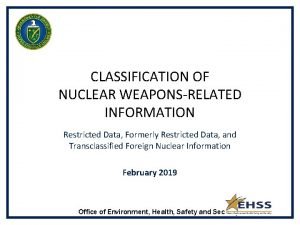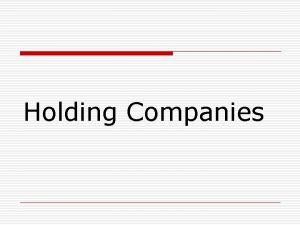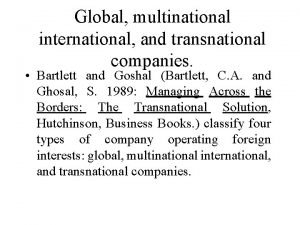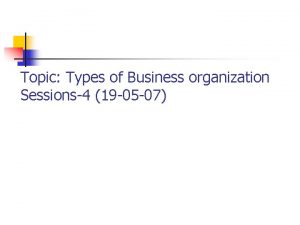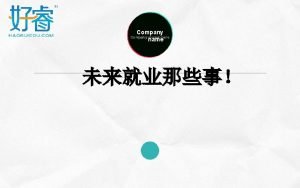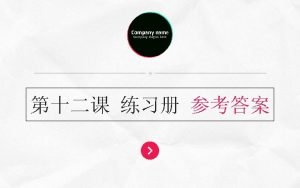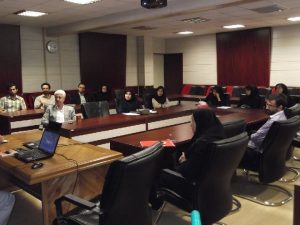The 3 M Company formerly known as the






- Slides: 6

• The 3 M Company, formerly known as the Minnesota Mining and Manufacturing Company, is an American multinational conglomerate corporation based in St. Paul, Minnesota. 3 M headquarters are in the St. Paul suburb of Maplewood, Minnesota. • With $30 billion in sales, 3 M employs 88, 000 people worldwide and produces more than 55, 000 products, including: adhesives, abrasives, laminates, passive fire protection, dental and orthodontic products, electronic materials, medical products, car-care products (sun films, polish, wax, car shampoo, treatment for the exterior, interior and the under chassis rust protection), electronic circuits, and optical films. 3 M has operations in more than 65 countries including 29 international companies with manufacturing operations and 35 companies with laboratories. 3 M products are available for purchase through distributors and retailers in more than 200 countries, and online directly from the company.

HISTORY Five businessmen founded 3 M in Two Harbors, Minnesota, in 1902. Originally a mining venture, the goal was to mine corundum, but this failed because the mine's mineral holdings were anorthosite, which had no commercial value. Co-founder John Dwan solicited funds in exchange for stock and Edgar Ober and Lucius Ordway took over the company in 1905. The company moved to Duluth and began research and producing sandpaper products. William L. Mc. Knight, later a key executive, joined the company in 1907, and A. G. Bush joined in 1909. 3 M finally became financially stable in 1916 and was able to pay dividends. Expansion • The company's late innovations include waterproof sandpaper (1921) and masking tape (1925), as well as cellophane "Scotch Tape" and sound-deadening materials for cars. • During the 1950 s, the company expanded worldwide with operations in Canada, Mexico, France, Germany, Australia, and the United Kingdom in large part by Clarence Sampair. In 1951, international sales were approximately $20 million. 3 M’s achievements were recognized by the American Institute of Management naming the company “one of the five best-managed companies in the United States" and included it among the top 12 growth stocks (3 M). •

• 3 M Mincom was involved in some of the first digital audio recordings of the late 1970 s to see commercial release when a prototype machine was brought to the Sound 80 studios in Minneapolis. After drawing on the experience of that prototype recorder, 3 M later introduced in 1979 a commercially available digital audio recording system called the "3 M Digital Audio Mastering System", which consisted of a 32 -track digital audio tape recorder and a companion 4 -track digital recorder for final mastering. 3 M later designed and manufactured several other commercially available models of digital audio recorders used throughout the early to mid-1980 s. • On August 30, 2010, 3 M announced that they had acquired Cogent Systems for $943 million. • On October 13, 2010, 3 M completed acquisition of Arizant Inc. In December 2011, 3 M completed the acquisition of the Winterthur Technology Group, a bonded abrasives company. • 3 M follows a business model based on "the ability to not only develop unique products, but also to manufacture them efficiently and consistently around the world (3 M)".

Environmental record • In 1999 the U. S. Environmental Protection Agency (EPA) began investigating perfluorinated chemicals (PFCs) after receiving data on the global distribution and toxicity of PFOS. 3 M, the former primary producer of PFOS from the U. S. , announced the phase-out of PFOS, PFOA, and PFOS-related production in May 2000. PFCs produced by 3 M were used in non-stick cookware and stain-resistant fabrics. • In 2002, 3 M ranked 70 th on the Political Economy Research Institute's (PERI) list of the top 100 corporations emitting airborne pollutants in the U. S. In March 2010, PERI ranked 3 M at 98 th place on the list. • In 2008, 3 M created the Renewable Energy Division within 3 M’s Industrial and Transportation Business to focus on Energy Generation and Energy Management. • In late 2010, the state of Minnesota sued 3 M claiming they released PFCs, a very toxic chemical according to the EPA but unknown at the time of release, into local waterways.

• 3 M traffic signals installed in • The Target Light Shelton, Washington. System, built by 3 M at Target headquarters in Minneapolis.

• The building in which the company was founded is now a museum
